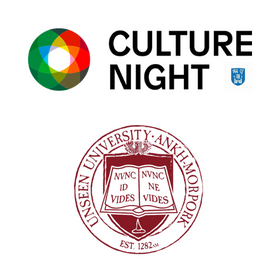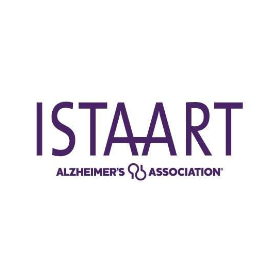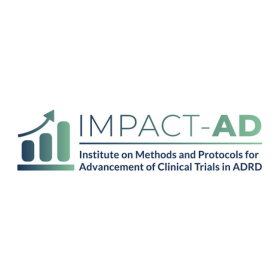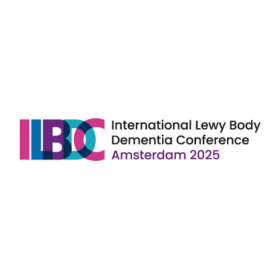All the events here are relevant to people working in dementia research. If you would like to add your own you can submit an event

- This event has passed.
Terry Pratchett at the Unseen University
23/09/2022 @ 5:00 am - 9:00 pm

The Pratchett Project in Trinity College Dublin is an interdisciplinary platform for research into the life and works of Terry Pratchett. It builds on the comprehensive collection of Pratchett’s works and their translations into forty languages, held in the Trinity College Library, as well as Pratchett’s personal connection with the College, borne out of the adjunct professorship he held from 2010. A further part of this endeavour is driven by Pratchett’s own life story and inclinations. In 2007, Pratchett publicly announced that he had a rare form of young-onset Alzheimer’s disease, called posterior cortical atrophy. He subsequently became a passionate campaigner who was determined to reduce the stigma of dementia. A docudrama on BBC followed the literary career and charitable work of the beloved author.
Hence, research into brain health has been an important part of the Pratchett Project in Trinity College. We are currently developing this strand of the project to find new ways in which the implications of breakthroughs in research can be “translated” for members of the public. We aim to bring people together from various backgrounds and fields to make new connections, to promote public understanding and awareness, to change perceptions and inspire people to support brain awareness campaigns and get involved.
This Culture Night, we will be joined by a wide range of speakers, each discussing Alzheimer’s Disease and related diseases, what we know now that we didn’t know when Pratchett started his efforts to raise awareness, and what the future might hold.
Book on EventbriteTerry Pratchett at the Unseen University Tickets, Fri 23 Sep 2022 at 17:00 | Eventbrite
PART 1- 17:00
The cutting edge
In part 1 of the programme, four scientists will review the latest insights from research, in specific areas in which major advances have and are being made. The emphasis is on the development of novel approaches to understanding and treating Alzheimer’s and related diseases.
Andrew Harkin is Professor in Pharmacology in in Trinity College Dublin. He leads a pharmacology research group in TCIN which is focused on bridging neuroscience to finding new medicines and is currently working on disease modifying treatments for neurodegenerative conditions.
Andrew will chart the insights gained over a century of research into select aspects of Alzheimer’s disease which have led to the ability to detect, diagnose and treat the symptoms of the illness. By further addressing gaps in knowledge and unmet needs, and with new therapies on the horizon, the research lexicon is changing from inevitable and incurable, to treatable, manageable and preventable.
17:15
Maeve Caldwell is Professor in Neuroscience in Trinity College. Her research is directed towards understanding the biology of Parkinson’s and Alzheimer’s disease. She has a specialist interest in brain and disease modelling using relevant cell populations derived from human induced pluripotent stem cells.
Maeve will present on the latest research using stem cell technology to study underlying mechanisms that lead to brain degeneration and drive new regenerative approaches and hope for a break-through.
17:25
Marie-Victoire Guillot-Sestier is Assistant Professor in Physiology in Trinity College and leading a research group to find new, safe and effective treatments for Alzheimer’s disease. Marie-Victoire works at the interface of Neuroscience and immunology, an emerging field that promises to deliver invaluable therapeutic tools.
Marie-Victoire will place a spotlight of the immune system which is implicated as a key factor in neurodegeneration. A better understanding is paving the way for next-generation therapeutic approaches aimed at harnessing the powers of innate immune cells of the brain.
17:35
Lorina Naci is Associate Professor of Psychology in Trinity College and a L’Oréal-UNESCO International Rising Talent. Lorina leads the ‘Consciousness and Cognition’ group at the Trinity College Institute of Neuroscience (TCIN) and GBHI. Her research has made ground-breaking contributions to the understanding of cognition and consciousness, and focuses on developing clinically applicable biomarkers of Alzheimer’s disease, 20–40 years before symptoms develop.
By 2025, an estimated one million people in the UK and Ireland will have dementia. What if we can find ways to detect it before symptoms appear, to predict who is at greatest risk and deliver new treatments that slow or prevent the disease? Lorina will present recent findings from the PREVENT dementia programme that she co-leads at Trinity College. The Prevent programme at Trinity is carried out in collaboration with Cambridge, Oxford, Edinburgh universities, Imperial College London in the UK and the INSERM Neuroscience, in France.
PART 2 – 18:00
Living with Dementia
Part 2 of the programme will focus how taking an interdisciplinary approach to battling Alzheimer’s disease promotes a broader awareness and breaks down stigma associated with dementia.
Brian Lawlor is Professor of Old Age Psychiatry at Trinity College Dublin and Deputy Executive Director of the Global Brain Health Institute (GBHI) at Trinity & University of California, San Francisco. He has been involved in the care of people with dementia for over 30 years, during which time he has carried out national and international research into the diagnosis, treatment and prevention of Alzheimer’s disease.
With over 30 years delivering care to those with Dementia, Brian will speak to his attempts in helping to demystify dementia in society while promoting actions that can be taken to keep the brain stimulated through activities like music and literature which reduce stress and anxiety and improve the quality of life for patients, their families and carers.
18:20
Matthew McAuslan is a Provost’s PhD Scholar attending TCIN. In addition to undertaking basic yet fundamental research within TCIN, his project offers additional opportunity to combine strengths with the GBHI and Trinity’s unique Pratchett Project towards a common goal to advance understanding and awareness of research on Alzheimer’s disease.
Matthew will share his experiences in undertaking a PhD in Trinity College where in addition to undertaking fundamental research within TCIN, his project offers an opportunity to link in with the Global Brain Health Institute and Trinity’s unique Pratchett Project working towards a common goal to advance understanding and awareness of research on Alzheimer’s disease.
18:30
Rachel Hegarty is the Poet Laureate for Dublin 1. Rachel’s debut collection of poems, Flight Paths Over Finglas, won the 2018 Shine Strong Award. Her third collection, Dancing with Memory, is a dance hall of memory for her mother who lived with Alzheimer’s.
Rachael will read from her third and most recent collection “Dancing with memory” where she rekindles her mothers’ dissipating memories through vivid, honest verses and dances, a gripping and emotional journey through her early memories in Dublin and her mothers’ journey through dementia.
PART 3 – 19:00
Speaking Up for People Living with Dementia
In part 3 of the programme, four activists will tell the story of Lewy Body Ireland (LBI), a new movement giving voice to those affected by dementia. Developed and driven by people living with and/or affected by dementia, LBI strives to build a community for carers, clinicians, researchers, dementia-inclusive creative artists, and those living with dementia in order to raise awareness, discover and disseminate knowledge, and provide support to those affected.
Iracema Leroi is an academic geriatric psychiatrist with a special interest in pragmatic interventions for the cognitive and neuropsychiatric aspects of neurodegenerative disorders, particularly Parkinson’s disease and Alzheimer disease. At St James’s Hospital in Dublin, Iracema leads the ‘Mind and Memory’ clinic, which aims to support people with cognitive and behavioral complications in Parkinson’s-related conditions, including Lewy body dementia. She leads a research programme which aims to understand the links among hearing, vision and cognitive impairment.
Iracema will bring insights and share advances from the clinic, particularly of the different forms of dementia including Lewy body dementia and her work in the Mind and Memory clinic at St James Hospital. Iracema believes strongly in including the patient and public voice in every aspect of her work and the organizations she works in.
19:20
Karen Meenan is an Atlantic Fellow for Equity in Brain Health in the GBHI working with scientists, academics, and artists to improve brain health on a global scale. Karen works with people living with dementia and their carers developing reminiscence theatre and radio broadcasts. She is a co-founder and director of Lewy Body Ireland and has recently been appointed Patient and Public Involvement and Communications/Dissemination Coordinator of Dementia Clinical Trials Network Ireland supported by the Health Research Board.
Karen will discuss her work as advocate, raising the profile of those living with dementia and their carers as true experts in the field, by sharing and promoting their stories through radio, theatre and music. Karen is the creator and host of ‘Tea-Time with Lewy’ a monthly online informal event for people living with Lewy body disease and their families.
19:30
Caoimhe Tyndall is an Irish Research Council PhD Scholar based in Trinity College Institute of Neuroscience. Her research explores new treatment strategies for neurodegenerative conditions like Lewy Body Dementia and Parkinson’s Disease. In addition to her laboratory work, Caoimhe strives to make a wider contribution by getting involved in education and outreach initiatives with the public.
Rebecca Maher is Panoz PhD scholar based in Trinity College Institute of Neuroscience. Her primary research focus is the development of new approaches for targeting drug delivery to the brain. From early on in her PhD, Rebecca has been involved in Lewy Body Ireland by helping to make the science more accessible to people with Lewy Body Dementia and their caregivers, families and friends.
Caoimhe and Rebecca are undertaking PhD projects which are focused on developing new treatments for dementia. They will describe how they engaged with LBI to develop a public outreach dimension within their projects in assisting with dissemination of research resources.
19:40
Kevin Quaid is an advocate for those living with Lewy Body Dementia. After his own diagnosis Kevin was one of the first patients in the world to write a book about Lewy body dementia “Lewy Body Dementia, Survival and Me”. He has since written a second book called “I am KEVIN not Lewy”. Kevin is a member of the Irish Dementia Working Group supported by The Alzheimer Society of Ireland and co-founder of Lewy body Ireland and works tirelessly to raise awareness about the condition.
As an expert in Lewy Body Dementia through lived experience, Kevin will draw from his written portrayal which serves as a guide for those navigating through life with dementia. His writing instils hope and shows how even with a difficult diagnosis, life can still be lived and enjoyed.
Part 4 – 20:00
Interview with Rob Wilkins, Terry Pratchett’s assistant
This concluding section will involve James Hadley, who coordinates the Pratchett Project, and Rob Wilkins who worked closely with Terry Pratchett for many years, both before and after his diagnosis. The two will meet in conversation, with exchanges with the other contributors, and members of the audience.
When you book your ticket, you will be offered the chance to donate an amount of your choosing to the Pratchett Project. The money raised through donations is put towards our research and outreach activities. The Pratchett Project brings together researchers working on any aspect of Terry Pratchett’s life and work to create new opportunities to push back the frontiers of knowledge.
An important aspect of the Project is continuing Pratchett’s work raising awareness about Alzheimer’s Disease, reducing the stigma associated with it and other brain health issues, and ultimately doing everything we can to help “get this thing out of our hair”.
While you wait for the event, you may enjoy taking a look at our YouTube Channel, which records some of our previous Pratchett Project events: https://www.youtube.com/ThePratchettProject





